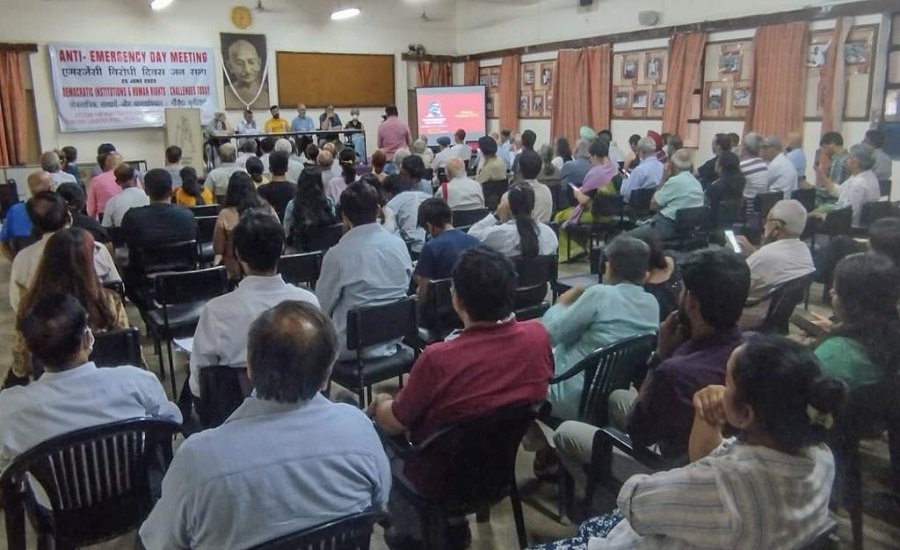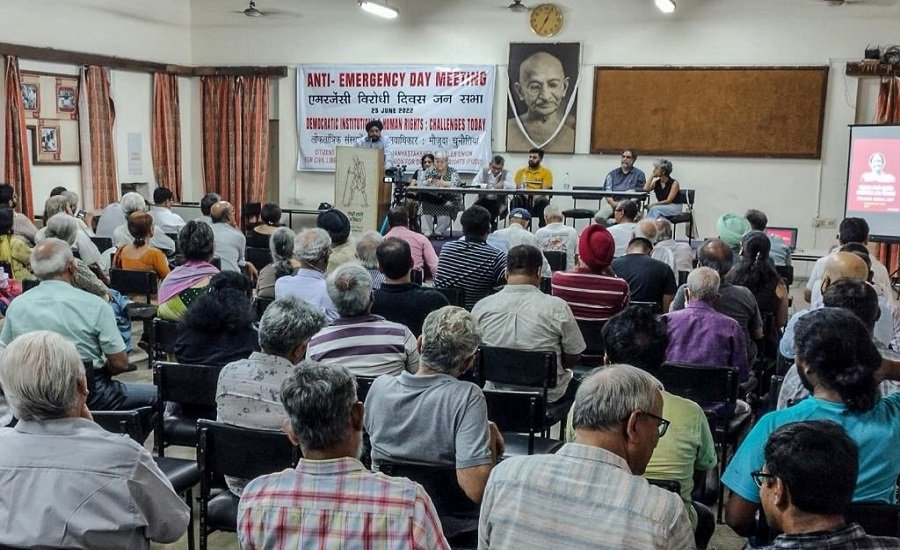At a meeting organised on June 25 at the Gandhi Peace Foundation in New Delhi, speakers recounted how the authorities are systematically depriving the citizens of their basic and fundamental rights and thereby attacking the federal structure of the country's constitution.
Team Clarion
NEW DELHI — The 47th anniversary of the imposition of the Emergency was commemorated in the context of the systematic and progressive erosion of the independence of institutions by the government in India at a meeting organised on June 25 at the Gandhi Peace Foundation in New Delhi.
At the well-attended meeting, speakers recounted how the authorities are systematically depriving the citizens of their basic and fundamental rights and thereby attacking the federal structure of the country’s constitution.
Speaker after speaker dwelt in detail on these challenges confronting us today. Noted human rights lawyer Nandita Haksar underlined the attacks on the federal structure of the constitution by the Modi government at the Centre. The marginalisation of the states in the distribution of political power also leads to the marginalisation of the ability of the respective state governments in being able to uphold the democratic aspirations of the people of different parts of the country and their common stake in the country as such.
Federalism, she said, is essential to deepen democracy and human rights in the country and as such ought to be on the agenda of the ‘Human Rights Movement’ in the country.
Mukesh Malaud of the Zameen Prapti Sangarh Committee (ZPSC) of Punjab highlighted the struggle of the landless Dalit peasants for their share of panchayat land in the state as a very different kind of political assertion of their rights which has challenged the stranglehold of the upper castes and big landlords over the rural power structure in Punjab. The struggle for land by the Dalits has also exposed the complicity of various ruling class political parties in suppressing the rights of the Dalits, including the present Aam Aadmi Party (AAP) government in the state when Dalits seek their share in society’s productive resources. Malaud also pointed to the massive effort at organising jagrans and other such programmes in Punjab by the RSS to win over Dalits to their side.

Editor of Caravan magazine, Hartosh Bal, emphasised that the complicity of institutions in the present situation in the country is not just out of fear but because the institutions have taken up the ideological agenda of the RSS-BJP combine and that the dominance of upper-caste Hindus in the society has played a pivotal role in this.
He held the upper caste Hindu monopoly in the ownership of the media. Secondly, the dominance of the Brahminical order in the newsrooms has become the most important reason why the mainstream media has become among the most prominent stormtrooper of the present regime.
Veteran journalist and activist Qurban Ali blamed the previous regimes for pursuing the social and economic policies which actually paved the way for the present onslaught on the minorities in the country. Rendering of Muslims to the status of second-class citizens and token representation of having just one Muslim, one Sikh and one Christian in the government is what inclusiveness and democracy have been reduced to.
He also pointed out that even social and democratic rights activists who had been raising voices against such discrimination are being implicated under draconian laws such as UAPA. The path that the country’s rulers have embarked on would lead us to become another Pakistan that could not remain united even for 25 years after its creation on account of following a similar ideological path.
Delhi University professor Nandia Narayan, while acknowledging the anomalies in the social, economic and political structure of the country which have maintained the exclusion and oppression of various marginalised sections, emphasised that such oppression has now become a matter of state policy. Education, which has played a liberating role in the lives of the people to usher in the overall development of society is now sought to be rendered an instrument of perpetuating inequality and oppression.

She outlined various processes and changes in the education sector being unleashed by the Hindutva forces towards this end. The New Education Policy (NEP) that has been introduced by the BJP government is nothing but a clubbing together of the neoliberal agenda in education with the Hindutva ideological agenda.
Human rights lawyer and a senior member of PUCL, T S Ahuja brought forth the comparison of experiences of the past emergency with the present situation in the country to highlight the far greater gravity of the present situation and the need of struggles for strengthening the institutional framework of India’s democracy.
Radhika from the PUDR said while an emergency was imposed in 1975 in breach of the constitution, the present de facto emergency in the country is ‘constitutionally ordained’. To substantiate her point, she called out the flagrant use of UAPA as a permanent law of oppression and the replacement of about 29 to 30 labor laws with just four labor codes as an institutionalized mechanism for rationalizing abolition of workers’ rights. Even though these labour codes are supposed to be enforced from July 2022 onward, these have already been made operational on the ground by way of around 100 executive orders enforced by the various state and the central government during the pandemic period. Minimum wages now will not be decided on the basis of the minimum needs of the workers but as per their respective performance.
All the speakers unequivocally condemned the arrest of the noted human rights activist and journalist Teesta Setalvad.
The meeting was presided over and conducted by senior journalist and the co-convener of Janhastakshep Anil Dubey. The meeting ended with a vote of thanks by Janhastakshep convener Vikas Bajpai.
They all noted that the ‘Anti-Emergency Day’ is being observed at a time when communal hate campaign against minorities is being institutionalised as a new norm in our social and political life when the democracy and the democratic values have been rendered devoid of content, when social and economic justice are made to appear as old fashioned ideas, and the credibility of electoral democracy stands compromised as never before.
Rather than the right to dignified livelihoods, the oppressed masses can only expect the ‘false generosity’ of doles disbursed by the rulers in return for their political loyalty. National Interest is being invoked to stubble out what remains of our fundamental rights as citizens with unabashed use of draconian laws.
The diversity that India has prided in is being steamrolled into a most detestable and ruthless uniformity. Even though these tendencies have existed for long, in the period of the Modi-RSS government these processes have become far more insidious, systematic, and systemic undermining our collective being as a society.




